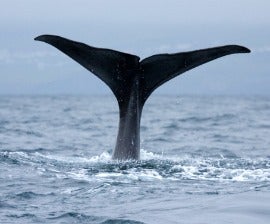-

HSI is fighting to save whales. Anzeletti/istock
-

Protestors get creative. Rebecca Regnery/HSI
-

The walkout. Rebecca Regnery/HSI
-

Protestors and police outside the meeting. Rebecca Regnery/HSI
-

A Jersey cow and calf in honor of the island. Rebecca Regnery/HSI
by Rebecca Regnery
The 63rd meeting of the International Whaling Commission saw some much-needed modernization of the rules of this more than 60-year-old convention. The member nations also demonstrated continued ability to successfully negotiate and compromise when they put their minds to it. However, when key issues regarding whales were raised, the pro-whaling faction resorted to their usual tactics, removing any doubt that the conservation-minded countries could let their guard down.
Consensus and compromise
The IWC has been plagued for years now with outdated practices such as allowing countries to show up and pay their dues with cash to be granted voting rights as late as the first day of the meeting. Anecdotal evidence supported by news investigations indicate that this facilitates corrupt practices such as vote buying. A proposal presented by the UK and other EU countries to modernize IWC rules and increase transparency was adopted by consensus in spite of delay tactics by some of the pro-whaling countries. The proponents and other pro-conservation countries agreed to compromise on some issues of great importance to them, including increasing observer participation.
Donate to support our work for whales and other animals year-round and worldwide
Other concessions during the meeting included Japan’s agreement not to request a commercial whale hunt on its coast, the withdrawal of a resolution by the U.S. and New Zealand for member countries to work more cooperatively, and an agreement by the UK to hold discussions between meetings instead of establishing a formal working group to address whale killing methods and welfare.
Delay and opposition
The meeting came to a impasse, however, when the Latin American bloc put forth a proposal to create a whale sanctuary in the Southern Atlantic Ocean. This proposal, which was first introduced 10 years ago, would protect whales in the region whose populations were decimated by years of commercial hunting. Although only five countries spoke in opposition, when the proponents of the proposal expressed their desire to vote on it, the pro-whaling countries including Japan, Iceland and Norway walked out of the room, preventing a vote by breaking the quorum.
This was a real slap in the face to the Latin American countries, who last year (along with Australia and other conservation-minded countries) had reluctantly joined consensus on a controversial humpback whale hunt in Greenland and this year agreed to compromise their strong stance on observer participation in the spirit of cooperation. After many hours of closed meetings, discussions on this topic were delayed until next year.
Politics and progress
After this and other obstructive tactics by the pro-whaling countries, there was no time left to discuss other whale conservation items on the agenda, including marine debris and ship strikes. Conservation organizations were only given the opportunity to speak once on whale protection. However, the chair did announce that a number of organizations including HSI had pledged contributions to assist small cetaceans, followed by additional funding pledges by Italy and France.
Main topics of discussion at this year’s meeting included cooperation, trust and transparency. However much of the meeting was held behind closed doors and a democratic procedure was blocked by the misbehavior of pro-whaling countries. It is clear that efforts made by some traditionally conservation-focused countries, including the U.S., to try to find a middle ground have been largely futile.
In contrast, the arrangement at this year’s meeting to contribute to a small cetacean fund is an example of the type of progress that can be made to increase protection for whales and other cetaceans when organizations and nations work together to address the growing threats to these animals.
Help whales and other animals by donating and taking action.
Rebecca Regnery is deputy director of wildlife for HSI.
